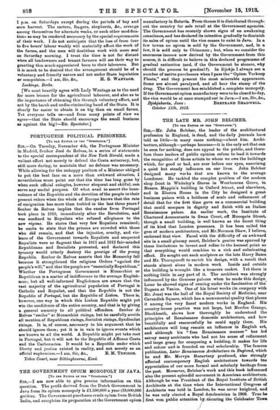PORTUGUESE POLITICAL PRISONERS.
[To TEE EDITOR OF THE “SPECTATOR.") SIR,—On Tuesday, November 4th, the Portuguese Minister in Madrid, Senbor Jose de Relvas, in a series of statements to the special correspondent of the New York Herald, made a valiant effort not merely to defend the Costa autocracy, but, still more daring, to maintain that no defence was necessary. While allowing for the unhappy position of a Minister obliged to put the best face on a more than awkward situation, I nevertheless must point out that the time has long gone by when such official eulogies, however eloquent and skilful, can serve any useful purpose. Of what avail to assert the bene- volence of the Republic and the devotion of the people to their present rulers when the whole of Europe knows that the rate of emigration has more than trebled in the last three years ? Senhor de Relvas implies that the exodus from Portugal took place in 1910, immediately after the Revolution, and was confined to Royalists who refused allegiance to the new regime. He states that very few Royalists remained; be omits to state that the prisons are crowded with those who did remain, and that the injustice, cruelty, and vio- lence of the Government towards Royalists and suspected Royalists were so flagrant that in 1911 and 1912 fair-minded Republicans and Socialists protested, and declared this tyranny would utterly destroy the prestige of the young Republic. Senhor de Relvas asserts that the Monarchy fell because it strengthened the religious Orders "against the people's will," and that the people are "essentially Republican." Whether the Portuguese Government is Monarchist or Republican is a matter of indifference to the average English- man; but all well-informed Englishmen are aware that the vast majority of the agricultural population of Portugal is Catholic and Royalist, and that the Republic is not the Republic of Portugal, but the Republic of Lisbon. There is, however, one way in which this Lisbon Republic might yet win the confidence of the entire country, and that is by giving a general amnesty to all political offenders. Senbor de Relvas "smiles" at Monarchist risings, but he carefully avoids all mention of Republican risings, Socialist risings, Syndicalist risings. It is, of course, necessary to his argument that he should ignore them; yet it is in vain to ignore events which are known to all the world. A Republic might yet take root in Portugal, but it will not be the Republic of Affonso Costa and the Carbonarios. It would be a Republic under which liberty and justice existed in reality, and not merely as an






























































 Previous page
Previous page